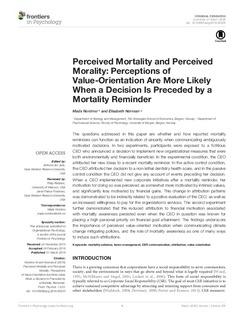| dc.description.abstract | The questions addressed in this paper are whether and how reported mortality
reminders can function as an indication of sincerity when communicating ambiguously
motivated decisions. In two experiments, participants were exposed to a fictitious
CEO who announced a decision to implement new organizational measures that were
both environmentally and financially beneficial. In the experimental condition, the CEO
attributed her new ideas to a recent mortality reminder. In the active control condition,
the CEO attributed her decision to a non-lethal dentistry health scare, and in the passive
control condition the CEO did not give any account of events preceding her decision.
When a CEO implemented new corporate initiatives after a mortality reminder, her
motivation for doing so was perceived as somewhat more motivated by intrinsic values,
and significantly less motivated by financial gains. This change in attribution patterns
was demonstrated to be indirectly related to a positive evaluation of the CEO, as well as
an increased willingness to pay for the organization’s services. The second experiment
further demonstrated that the reduced attribution to financial motivation associated
with mortality awareness persisted even when the CEO in question was known for
placing a high personal priority on financial goal attainment. The findings underscore
the importance of perceived value-oriented motivation when communicating climate
change mitigating policies, and the role of mortality awareness as one of many ways
to induce such attributions. | |

